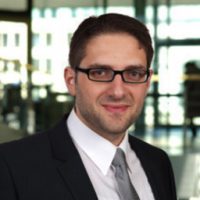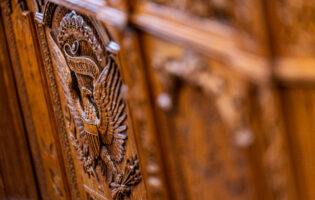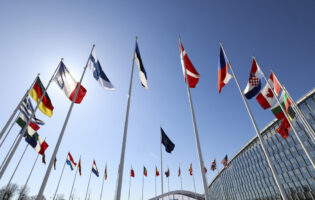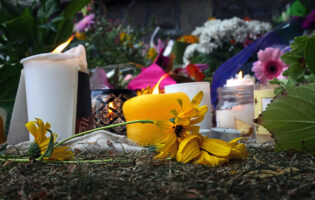Challenging Times: Muslims and their Role in Shaping the Future of Germany

Ufuk Topkara
Humboldt University Berlin
Dr. Ufuk Topkara is Visiting Professor of Comparative Theology in an Islamic Perspective at the Berlin Institute for Islamic Theology, Humboldt University Berlin.
Dr. Topkara was a DAAD/AICGS Research Fellow from October to December 2018. He has been active in promoting inter-religious dialogue since 2005 as an expert on Islam for the Evangelical Academy Berlin, as a member of the Jewish-Turkish Roundtables for Dialogue, and with the Catholic Academy Berlin. Dr. Topkara was a Tour Guide at the Jewish Museum of Berlin from 2005 to 2015. He was a Humanity in Action Fellow in New York and worked in the U.S. House of Representatives as a Humanity in Action-Lantos Fellow in Washington, DC. He studied History and Philosophy at Humboldt University of Berlin and Harvard University. He completed his doctoral dissertation with the Graduate School of Islamic Theology at the University of Paderborn, Germany, analyzing the convergence of reason and faith in Islam.
While at AICGS, Dr. Topkara will conduct research on a project that emerges out of the interconnected strands of intellectual inquiry: comparing the experiences of discrimination faced by Jews in early twentieth century Germany and the experiences of discrimination faced by Muslims in contemporary Germany. By drawing parallels between the marginalization faced by these two religious minority groups, Dr. Topkara will provide a tool for combating rising anti-Semitism and anti-Muslim sentiment in both Germany and the United States today.
Dr. Topkara intends to showcase patterns of marginalization and othering of religious minorities in contemporary German society. A comparison between the Jewish community of the early twentieth century in Germany and contemporary Muslim community in Germany is particularly promising because of the inherent questions of belonging. Similar to the experience of German Jews in early modern times, German Muslims nowadays struggle with locating their place within German society. In both cases, the religious minority brought up questions of belonging that goes beyond citizenship, that is, the inclusion if not appreciation of cultural and religious differences.
The Muslim community is at the forefront of public debate, not only as a result of the post 9/11 era, but more so because of questions related to Islam and its convergences with a democratic, pluralistic society. Whereas some Muslims ignored these inquiries into their faith for too long, others sincerely tried to engage in discussion.
German society in particular, and without a doubt the rest of the Western world, is worried and puzzled; some even feel a level of threat posed by both Islam and the Muslim community. The reactions to those fears deviate in form and expression quite dramatically. Whereas some are sincerely and seriously engaged in critical debates that avoid stereotypical generalizations, others fuel the somewhat paranoid attitudes toward Islam and Muslims.
There is a wide range of issues being addressed and dealt with critically, ranging in form and content from small community-based gatherings to long-lasting social projects and involving various groups from within and outside the Muslim community. Going through these debates—at times quite emotional and heated—helped the Muslim community to better understand the concerns of the wider German audience. As a result, the Muslim community developed a formerly lacking sensitivity to issues such as domestic violence, forced marriages, violence, and religious extremism. However, time and again, many Muslims express their frustration with how the discourse unfolds itself, both in the wider political arena and on the small-scale community level. Frankly speaking, it becomes tiresome if not at some point even absurd when a Muslim speaker at any given discussion always has to deliver remarks about denouncing and condemning acts of violence and terrorism.
Admittedly, it took the Muslim community too long to address these issues, and there is still work ahead for the community. However, if one surveys the popular notion on Islam in German society, one cannot help but see a somewhat undifferentiated approach toward the Muslim community as a whole and to Muslims as individuals living in Germany.
Debates on Muslim Identity in Germany
The right of individuals to identify themselves through cultural, religious, and traditional means available to them is indispensable in a democratic society. Muslims in Germany are as diverse as any other group. For many, their religious identity is not even the most important characteristic of their personality. We have to acknowledge the variety of possible identifications and regard them not as a threat but rather appreciate them as expressions of freedom and plurality. Therefore, we should realize that Muslims not only carry multiple identities but that those identities also perfectly harmonize with each other. They are neither contradicting themselves nor do they prevent the individual Muslim from being at the same time German, Turkish, Arabic, Bosnian, male, female, or any other given category.
Still, many Muslims seriously struggle with the notion of alienation and separation that is being repeatedly cultivated in Germany. Muslims are constantly told, implicitly or explicitly, that their set of values—their religion—does not fit into the larger framework of German society.
Receiving those kinds of statements from individuals is disturbing enough, and yet it becomes even more puzzling when politicians, who should by definition be more aware of democratic pluralism, forge an agenda that is clearly directed to make a statement against Islam and Muslims. One such example, among many, is the infamous Horst Seehofer, who sees himself and his party, the CSU, at the forefront of defending Christian values against the Muslim intruders. He also does not tire of emphasizing Germany’s Judeo-Christian roots, and thereby implying in passing that Muslims will never be part of Germany. One could also mention the stark criticism and somewhat fundamental opposition the former President Christian Wulff faced when he asserted that Islam and Muslims also belong to Germany.
Ignoring that the tone of those debates is already hurtful enough, it creates a certain discomfort and deeply felt disappointment on the side of German Muslims. At times one no longer knows how to react to those confrontations. Above all, many young Muslims feel increasingly discriminated against, alienated, and excluded from larger society; a highly disturbing development.
But why is the debate surrounding the Muslim community and its role in German society so entrenched with notions of exclusion, segregation, separation, and alienation? On the one hand, we have to underline the larger global and political framework. On the other, there is a historically formed impression that the Muslim world, in the form of the Ottoman Empire, for many centuries resembled the archenemy of the Western world. Its significance should not be over-emphasized for our present times, but we cannot entirely deny some effect either.
Islam and Muslims are not only perceived within the realm of a particular society, but more so as a global community that allegedly seeks a separate agenda, i.e., the establishment of a theocratic state and introduction of the Muslim legal system (sharia). All of this is diametrically opposed to what Western societies would consider their core identity, the representative democracy. Even a cursory look at the political developments in major Muslim countries over the course of the last decade creates a bewildering confusion. The wider audience is aware that some Muslim countries have experienced ongoing and devastating eruptions of violence. The Arab Spring contributed somewhat to the notion that Muslim countries are in the midst of a transition process with a mostly unpredictable outcome. Where is the Muslim world headed? Why is the Muslim world so inflicted with political conflicts that even turn into civil wars, as we can recently observe in Syria? Why is the Muslim world at the forefront of so many unresolved conflicts that remain critical for the rest of the world? And what does this mean for our society? If we seriously engage these questions we will not be able to provide clear-cut answers. To the contrary, we have to offer a set of conclusions that do not defy complexities but rather attempt to explain them. Reducing the complexities of our modern day world to simply graspable categories makes it almost impossible to raise awareness for differentiation. The status of the Muslim world and the prevalence of violence and political turmoil is a result of a web of highly conflicting ideas and interests. Religion certainly plays a critical role in this process; however, it is one among many others. More importantly, it is simply not reasonable to assume that Muslims all over the world agree on the interpretations of their faith. Islam does not endorse violence or a theocratic state or a legal system for that matter. People who identify themselves as Muslims might do that. However, all Muslims as a collective group end up being held accountable for acts of violence and all sorts of other outrageous and inhuman actions that have been committed in other parts of the world. Muslims are depicted as a group that does not necessarily uphold the same values as the society at large, and ultimately they are viewed as an entity that basically denies almost all means that a democratic society has created in order to moderate all sort of conflicts.
Consequently, we can easily detect a growing tendency to negate the critical paradigm of all democratic societies: differentiation. We hereby undermine the very core of a democratic society and we should be alerted to the long lasting repercussions once that fundamental principle starts to fade.
The Anti-Muslim Debate
The status quo in Germany could not be more challenging, both for Muslims and also non-Muslims. First and foremost, Muslims assume that there is a sentiment in German society repeating the story that Muslims essentially do not belong in the Western world and, to put it diplomatically, that their presence in Western societies poses a series of demanding challenges. The perception of Muslims in general and German Muslims in particular is largely associated with the aforementioned issues of terrorism, violence, segregation, forced marriages, domestic violence, lack of integration, etc.
Many racist, Islamophobic, and anti-Muslim commentaries or statements are being published in the Internet; among many the webpages “Politically Incorrect” has established itself as the preeminent voice, ‘raising awareness against the Islamic threat.’ Those kinds of “critiques” of Islam and the Muslim community do not form a homogenous body, nor are they necessarily connected to each other. However, one particular author has received considerable attention for his book on integration and the future of Germany.
Addressing the lack of integration in the Muslim community in Germany, Thilo Sarrazin, an SPD politician who served on the board of directors of the German Bundesbank, states an unbridgeable gap between western civilization and the Muslim world. Built upon supposedly undisputable statistical evidence, enriched with highly questionable if not scandalous findings, he diagnoses a genetic degeneration of the Muslim community, resulting in an intellectual deficiency that ultimately harms society at large. Sarrazin’s thesis culminates in the observation that Germany is abolishing itself by allowing those culturally and religiously incompatible ethnicities to live and excel in Germany. He concludes by suggesting a radical restriction of immigration from Muslim countries and to deny social welfare benefits to families who are unwilling to integrate into German society.
One should not underestimated the paradigmatic change Sarrazin’s book has caused on both ends. Sarrazin’s pamphlet against Muslims has marked a critical turning point. Sarrazin claims to go beyond random accusations, arguing that he has provided a supposedly scientific basis for his thesis, which makes his book sound not only more profound, but moreover it facilitates the reception of his crude ideological statements. Sarrazin claims the highest possible credibility for his project: scientifically evident, reasonable conclusions. With his book, he penetrated German society with regard to the Muslim question in a way no one else has before him. The long-term consequences of his argument remain to be seen, and yet the short-term implications for the Muslim community are nothing short of devastating. Although many Muslims felt uncomfortable listening to Sarrazin’s theses, they were extremely disappointed if not shocked by the reaction of the German audience, which was basically applauding that someone finally had the courage to speak his mind. Some left the country, migrating to the homelands of their parents’ generation; others remain in a state of indifference toward the ongoing debate, resulting in a sort of self-isolation.
Even though more and more German Muslims might not see much ground for optimism, there are still many reasons to believe that German society and the Muslim community as a part of this society will work together to overcome the challenges. As much as Muslims are asking for differentiation they also have to acknowledge that German society does not act as a homogenous body. We have to note, for instance, that almost all commentators, ranging from conservative to liberal positions, have unanimously criticized Sarrazin. And more importantly, the debate also stirred a political reaction, which then resulted in a series of decisive conclusions that might revise the course for the better. One might even go one step further and state that something good came out of this infuriating discussion after all. It is intriguing how quickly long-lasting sentiments sometimes can be altered in Germany. Whereas Germany still implicitly and at times even explicitly refuses to acknowledge its status as an immigration country, it has recently introduced a series of new decisions to engage with its growing Muslim community. Given how long it took German authorities to recognize the Muslim population it is, without exaggeration, remarkable how determined the current German government seems to be in pursuing a new agenda.
Establishing Islamic Education in Schools
Almost two years ago the Federal Board of Sciences (Wissenschaftsrat) published a communiqué in which the board suggested establishing chairs of Islamic Theology at German academic institutions and universities. The government quickly followed this recommendation and endowed several universities with funding in order to support the emergence of Islamic Theology. Additionally, the Mercator Foundation launched a Graduate School for Islamic Theology in order to help educate qualified academic professionals. Establishing Islamic Theology aims to achieve mainly two goals: First, by providing an academic platform for the Muslim community, Muslim students can finally scrutinize their faith based on scientific criteria rooted in Islamic customs and traditions. Consequently, Muslim students will be able to access their religion through an intellectually sophisticated and compelling study, instead of visiting Muslim schools in which typically a more traditionally perceived Islam is taught. Traditionally perceived, in this particular context, means that most of those schools and mosques were founded by Muslim migrants whose personal backgrounds do not allow them to intellectually question the religious authority of preachers from respective Muslim countries. Hence, by and large Islam in Germany was highly influenced by the understanding of what Islam is in the individual Muslim countries; an unsatisfactory situation that can no longer be tolerated. Religion unfolds itself in socio-cultural frames; it is therefore difficult to apply one society’s perceptions and interpretations of religion to another.
Offering German Muslims new platforms and resources will consequently help to overcome this dilemma. Islamic Theology will help by educating academically-trained personnel for the public school system in which many Muslim students seek religious education.
Second, the pursuit of Islamic Theology within German academia will help foster the acknowledgment of German Muslims as equally responsible members of the community. Islamic Theology will not remain within a vacuum. Muslim theologians will have to engage with the vast and long-lasting tradition of German thought and philosophy. Ultimately they will help forge an understanding of Islam, which will be open to academic scrutiny as much as to reasoning. This will help to not only accommodate Islam in Germany, but will also encourage Muslims and non-Muslims alike to strengthen mutual understanding.
A Younger Generation Finds Its Voice
Finally, many young Muslims are increasingly engaging in the debate and asking for a more active and participatory role in German society. One project focused on encouraging young Muslims to engage in Germany is JUMA (Young Muslim and Active), which originated in Berlin in December 2011. The young Muslims who convene under the tenet of JUMA come from various socio-cultural and ethnic backgrounds, including different levels of religious observance. Observing these young men and women in debates and listening to their reasons for why they want to become involved in this process is both illuminating and rewarding. A new Muslim generation is evolving. They are articulating their willingness to take on even the most conflicting topics, they want to learn, and they are curious and open-minded, ready to shape society’s views on Islam and to absorb and accommodate Germany, German society, and German history within their own identity. The outcome of this endeavor remains to be seen; however, we all have much reason to believe and hope that this upcoming generation might have an effect on the fine print of German society.









